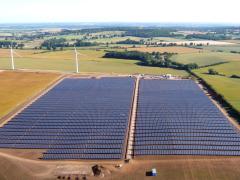by Lucas Chaumontet, et al, BCG
African countries like South Africa face major climate-related challenges, but at the same time they have the opportunity to achieve sustainable low-carbon economies, according to a new report by Boston Consulting Group (BCG).

The report, titled “Building a Climate-Resilient, Low-Carbon, Job-Rich Africa,” identifies particular disadvantages that South Africa and other countries on the continent must overcome, but also their potential to become a model for transforming a power system based on fossil fuels to one based on renewables.
Although Africa as a whole was responsible for only 4% of global CO2 emissions in 2019 – with South Africa responsible for 33% of these emissions – it accounts for 35 of the 50 countries worldwide that are at greatest risk from the effects of climate change. Even in a scenario where average temperature increases are limited to 2°C, the costs of adaptation for Africa could exceed US$35-billion a year by 2050, rising to $200-billion a year by the 2070s.
To make the transition to climate resilience over the coming years, the continent must attract extensive global investments in decarbonisation and other climate-related projects and must mobilise African leaders and the international community to realise those investments.
“Collaborative action by South Africa, other African countries and the international community can advance sustainable development, enable Africa to emerge stronger in the burgeoning net-zero economy, and drive progress in confronting the climate threat—not just for Africa, but for the planet as a whole,” says Lucas Chaumontet, managing director and partner at BCG, Johannesburg and co-author of the report.
Working towards a just transition in South Africa
In South Africa, the just transition involves a shift toward environmentally sustainable economies and societies for all. Such a transition must be well managed and must contribute to the goals of decent work, social inclusion, and freedom from poverty for all South Africans.
Leaders must create sound plans for national climate resilience that identifies solutions to their countries’ specific challenges and opportunities. Challenges include a fossil fuel-based energy system, and high levels of inequality, poverty and unemployment – but opportunities include vast, high-quality renewable energy resources, competitive production costs of green fuels like hydrogen and net-positive job creation if the country can successfully localise elements of the renewable energy value chain and effectively re-skill the workforce.

Green hydrogen, produced by means of renewable-energy-powered electrolysis, will be an important enabler of decarbonisation across sectors, particularly in hard-to-abate sectors such as steel, cement, heavy-duty road transport, aviation, and shipping. A key element in low-cost green hydrogen production will be the availability of sufficient high-quality renewable energy resources.
“Many African countries, including South Africa, are endowed with vast renewable energy resources of their own and could produce green hydrogen at globally competitive prices,” says Kesh Mudaly, project leader at BCG Johannesburg and a co-author of the report. For example, South Africa could generate green hydrogen at a levelised cost of roughly $1,60/kg by 2030, making it competitive with the corresponding 2030 levelised costs in Australia and in Saudi Arabia.
Unlocking South Africa’s vision of a just transition against this backdrop, at national and sectoral levels, hinges on key building blocks: job creation; social and ecological welfare; managing geographic and cultural dislocation of communities; education, capacitation and reskilling; economic inclusion and participation, especially of the youth and black women; ownership; quality of work; infrastructure planning and rollout; policy and governance; and funding.
Ultimately, achieving a just transition requires a conversation that includes all stakeholders – followed by a commitment to taking collective action.

Making progress toward net zero
South Africa and the rest of the continent have the chance to create resilience for their economies and societies, and to advance their industrial development. To avoid disastrous consequences and seize promising opportunities, South Africa, African countries and the international community should prioritise three actions:
- Invest massively in climate adaptation. African countries must mobilise massive funds to build climate resilience. Collaboration with and financial support from the international community will be critical to achieving this.
- Build the foundation for low-carbon, socioeconomic development. By leveraging new technologies and business models, African countries can chart their own low-carbon development paths optimised to local contexts.
- Accelerate the creation of local green manufacturing capabilities. African countries need to harness their natural resources and local capabilities to drive the creation of localised green manufacturing hubs in renewable energy, carbon sequestration, climate-resilient food systems, and other areas. Doing so can create millions of jobs and spearhead Africa’s industrial development.
“The road to COP27, which will take place in Africa, needs to bring global and African leaders together to meet the financial, technological, and capacity-building challenges that will not only shape Africa’s future but also significantly affect the global path to net zero. African leaders should create sound, national climate resilience plans that identify effective responses to their countries’ specific challenges and opportunities, and richer nations should be prepared to invest in activating those plans. Developed countries that have historically contributed the most to global emissions must help unlock the required investments from both the private and public sectors,” concludes Patrick Dupoux, a BCG managing director and senior partner, and a co-author of the report.
About Boston Consulting Group
Boston Consulting Group partners with leaders in business and society to tackle their most important challenges and capture their greatest opportunities. BCG was the pioneer in business strategy when it was founded in 1963. Today, we work closely with clients to embrace a transformational approach aimed at benefiting all stakeholders—empowering organizations to grow, build sustainable competitive advantage, and drive positive societal impact.
Our diverse, global teams bring deep industry and functional expertise and a range of perspectives that question the status quo and spark change. BCG delivers solutions through leading-edge management consulting, technology and design, and corporate and digital ventures. We work in a uniquely collaborative model across the firm and throughout all levels of the client organization, fueled by the goal of helping our clients thrive and enabling them to make the world a better place.
Contact BCG, https://www.bcg.com/en-za/













